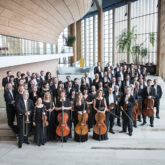
Budapest
Mozart, Beethoven, Rachmaninov-Kocsis
Zoltán Kocsis Season Pass 2.
Kálmán Berkes clarinet soloist and conductor
Rachmaninov-Kocsis Etude-Tableaux
Rachmaninov’ études – by Zoltán Kocsis
„Composed in 1911 and 1916 (Op. 33 and Op. 39,respectively), the études-tableaux were highly successful and were popular repertoire pieces of celebrated pianists. True to its name, the set consists of painterly descriptions, motivated accounts of experiences, moving psychological portraits, rather than mere études. And as such, they lend themselves well to orchestration. Unsurprisingly, Respighi’s cycle of five pieces (Études-tableaux (5) Op. 160) stood the test of time and when in 2003 I first presented them to the Hungarian audiences, I secretly envied the brilliant orchestrator for having a free hand to pick the most characteristic and effective pieces of the two sets. Perhaps subconsciously it was then that I decided to follow suite and orchestrate a few études-tableaux.” (Zoltán Kocsis)
Beethoven Symphony no. 7 in A major, op. 92
Poco sostenuto. Vivace II. Allegretto III. Presto IV. Allegro con brio
The Seventh Symphony was written in 1811-1812 and the manuscript records it was completed on May 13th. The emotions displayed in the work are determined by world events (the Napoleonic wars) and an upbeat period in the composer’s private life (a notable episode of which was summer spent in Czech Teplitz when Beethoven, despite his closed, misanthropic nature, enjoyed a lively social life.) The symphony strikes a tone which had not been heard in Beethoven before and which had no precedent elsewhere. “This symphony is an expression of heightened, passionate celebration and almost cloudless brilliance, transposed into music as never before. Its themes are more passionate and dynamic, its orchestration more brilliant and strident than any orchestral work so far! Even Mendelssohn could marvel at the splendour of the orchestration without reservation. It is not by accident that Beethoven once said he was teaching people with his music the divine frenzy of the spirit.” (Dénes Bartha)



